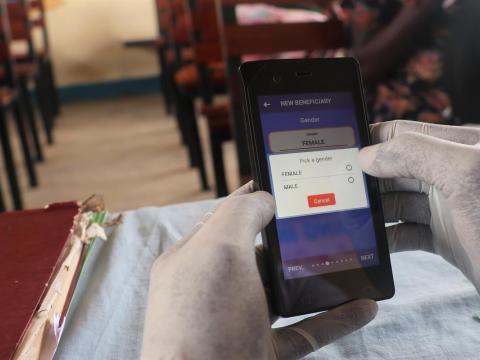
If digitisation is a winner, who or what loses?
COVID-19 has helped to move efforts to go digital forward at a greater pace, bringing huge benefits but, Colin asks, at what cost?
By Colin Dyer
As I sit at my computer, with my mobile phone on the desk and a streaming service playing my favourite tunes, I recognise the powerful role technology plays in my life. Every day there is a new advancement in the power and the accessibility of technology, and I am one of the lucky ones to benefit so much from it. There is no point going to a bank to withdraw money or apply for a loan; it can all be done on my phone or computer.
It seems that technology could be the answer to many of the issues that development practitioners face in challenging contexts. For example, data can be made available via wireless connectivity, in real time from the unreachable corners of a country, and decisions can be based on elaborate dashboards that amalgamate inputs into graphs and grids in an instant. Evaluations can be conducted remotely, and surveys done on mobile devices from across the world. The opportunities and applications seem endless.
But among the wins, we must acknowledge the potential losses. What is the cost of promoting digitisation without restraint, consideration, and hesitation? What is the human, social and interactive cost of rapid and unfettered technology uptake such as digitisation?
In a recent article, author Neil Devons suggests that digitisation must serve a higher purpose. He argues that we need to ask questions about the human impacts of the introduction of this type of technology. He goes on to discuss that digitisation in businesses needs to be first and foremost human centred, and must serve a clear purpose and enhance human effort, not replace it. Like Devons, I think that there is more to consider than just technological uptake and efficiencies.
Like mine, local banks in many developing countries have largely gone online to enhance their reach and minimise operational costs. In many of these contexts, mobile money products have replaced local moneylenders and services advanced through digitised micro finance institutions. But where is the humanity in that?
Humanity and human interaction is vital because only humans understand why failing rains affect a farmer’s ability to payback his loans, or why cash is vital to pay a local supplier of grain. Building clones of the individualised, private, and materialistic 'global north’ is not the answer to every problem.
We must question whether people (customers) are more resilient and empowered as a result of digitisation, or if the benefit mostly for the banks and profit-driven enterprises. What is happening to the traditional contextual values that can build and enhance people-centred connectedness and will carry the community through the challenges of life? Just because the technology and the knowledge are available does not mean they should automatically be applied.
Similarly, another example of over-emphasised technology is the wholesale push to digitise savings groups. If the group can stay connected via their mobile phones, make deposits and take loans via mobile money and an app, why should they meet in person? If the supporting organisation can keep track of the groups’ progress via a secure dashboard the tracks activity, why would staff need to leave the office? Our experience is the human connection is a more powerful driver of change than the mechanisms we use. The value of the savings group is equally in the connection as it is in the transactions. Groups meeting together share life stories, wisdom, and practical support for each other. Relying only on digitisation could eradicate this just as the development worker could miss out on capturing key group dynamics, identifying strengths, challenges, opportunities and weaknesses that a dashboard will struggle to identify.
We need to view technology through a people-centred lens that assesses the costs and the benefits against a wider set of tangible and intangible criteria. The uptake and advance of digital technology is not going to be halted, and for those that are vulnerable and poor, the introduction of appropriate digitisation advancements could be transformational.
If the last year has taught me anything, the digital age can be a double-edged sword. Some consideration about what could be lost—that is truly valuable—needs to always be added to the conversation.
Colin Dyers is World Vision's Global Livelihoods Senior Advisor for Quality and Innovation. Find out more information about World Vision’s Savings for Transformation project model and our current pilot to digitise data capturing in Rwanda. If you have any further questions or comments, please contact us.